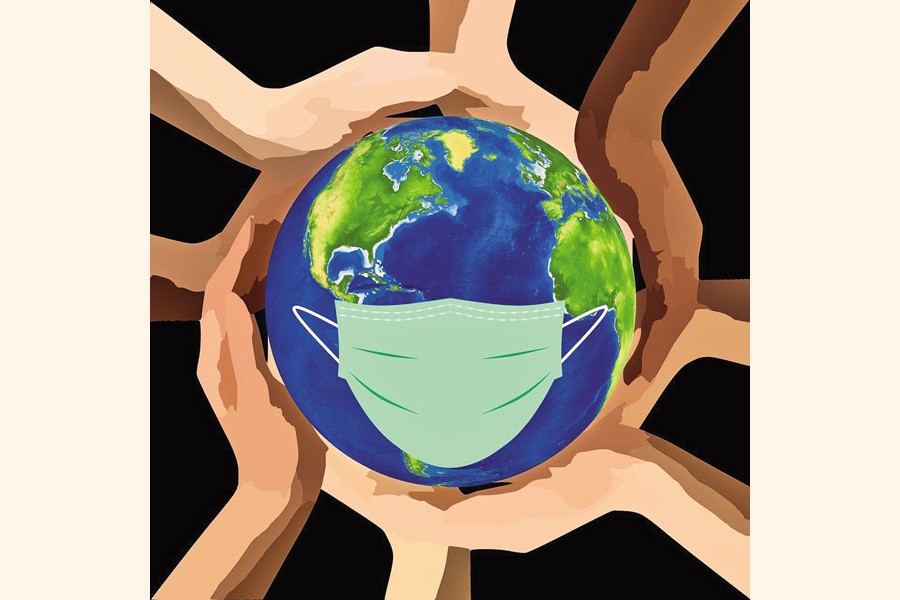As another 'World Health Day' observed during a time when the need for adequate healthcare services are more than ever, the World Health Organization (WHO) promoted the theme 'Building a fairer, healthier world' on April 07 across the globe. Aim of the campaign this year was making healthcare facilities available for all, irrespective of the conditions in which they are born, how they live and what they earn. Although the day, being sponsored by WHO, is celebrated in a formal demeanour in various UN countries and relevant organisations around the world, it is time to reflect whether it has any real life implication or not.
The concept came from the need for establishing a day dedicated entirely to spreading awareness highlighting a particular theme based on the health needs of the population. It was introduced in the first world health assembly in 1948. Two years later, the first World Health Day was celebrated on March 07 with the motto 'Know your health services.' Since then, World Health Day is being celebrated every year drawing attention to WHO's work addressing the current global health priority.
The UN countries celebrate this day by arranging events at local, national and international levels which include conferences for health workers, briefing for local politicians, and informational displays for children and young people. The day, having been continuously celebrated over the past 70 years to highlight important health issues, is marked by activities which extend beyond the day itself.
This serves as an opportunity to address important aspects of global health such as control of communicable diseases, mental health, maternal and child care, and climate change. For instance, during this ongoing pandemic, WHO suggested people to join them in celebrating the day by thanking the frontline workers, by mailing the doctors and nurses or utilising social media platforms to thank them, promoting healthy eating habit, practising mindful meditation and virtually guided group meditation - all while being in the comfort of their homes.
Alongside other UN countries, formal celebrations take place in different medical colleges across Bangladesh, although its real application is yet to be followed. Reflecting on the day, medical officer at Shaheed Ziaur Rahman Medical College Hospital Dr Tahsin Fahmida wishes that they could utilise their resources invested in the health sector more wisely, be it human resources or infrastructure or money. No doubt there is a shortage of resources in the healthcare sector in Bangladesh. However, even the limited resources are not being utilised properly, as Dr TahsinFahmidaregrets.
In Bangladesh, the Covid situation is constantly deteriorating with the highest number of infections within a day crossing 7,000 mark. With Covid cases soaring sky high, all the government hospitals have been saturated. Centers for Disease Control and Prevention (CDC) has discouraged travelers to travel to Bangladesh-- even fully vaccinated ones-- as the country is currently in the level 4 stage of infection.
With the intensive care units of the government hospitals filled to their capacities, only a certain privileged section can access private healthcare services spending a hefty sum. Healthcare facilities are deemed as an extravagance to the underprivileged people while they are struggling to make ends meet due to the financial crisis caused by the pandemic. To address this issue, WHO urges leaders to monitor discrimination and plan solutions through which quality healthcare can be ensured wherever and whenever it is required. Keeping in mind this year's theme of building a fairer and healthier world, WHO is determined to ensure that everyone, everywhere, can realise the right to good health.
WHO scientists have been working relentlessly from the beginning of the pandemic to find out correct information regarding the SARS-CoV-2 that can help the world to curb the catastrophe. After thorough research, WHO has laid out safety guidelines- wearing masks, washing hands frequently, keeping three feet distance from others, avoiding crowds and poorly ventilated places.
In addition, WHO has been advocating the importance of getting the vaccine soon after its development reassuring the mass people time and again that it is safe.
The success of this yearly day-long event observation lies in how effectively the health professionals and the government can encourage people to follow safety guidelines and sketching out ways to surmount the obstacles in making healthcare available for all. Thus, focusing more on activities that can have a far- reaching effect compared to observing mere formalities on the World Health Day can bring about a positive change.
And the core message that needs to be communicated with the mass population, as stated by junior consultant of medicine at Dhaka Medical College DrRefat Al Imon, is, "Maintain physical distance this year to remain healthy longer."
The writer is a third year MBBS student at Dhaka Medical College.
[email protected]


